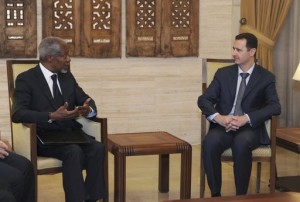UNITED NATIONS — As the ongoing conflict in Syria churns out a ghastly humanitarian carnage, diplomatic efforts to halt the violence are shadowed by last year’s Libyan intervention, which morphed into a six month long military operation to topple a tyrant.
So when the UN Security Council met again on Britain’s initiative to debate the situation in the Middle East, while there was a focused theme to stop the spiral of violence in Syria, at the same time there was an underlying and unspoken agreement not to introduce the threat of outside military force.
Literally one year ago this week, the Security Council passed a powerful but legally open-ended resolution to protect the besieged Libyans civilians in Benghazi which were in the gun sights of Col. Gadhafi’s regime. But acting under the “responsibility to protect,” the Anglo/French and later American mission quickly evolved into a full blown NATO air assault throughout the vastness of Libya which ushered in regime change.

Russian Foreign Minister Sergey Lavrov clearly alluded to last year’s Libya resolution and said of Syria, “ whatever goals might be set in any given situation they should not be achieved by misleading the international community or manipulating UNSC decisions.” This was a clear reference (and regret) to Moscow having abstained on last year’s Libyan resolution passed on St. Patrick’s Day.
Now a year later, there’s hesitation to give the Security Council’s blessing to operations which could involve varied military options. Nonetheless there’s the redoubling of a diplomatic surge with the Damascus peace mission of former UN Secretary General Kofi Annan to try to defuse the widening crisis between Bashar Assad’s dictatorial rule and a plethora of dissident factions both religious and political.
UN Secretary General Ban Ki-Moon asserted, “what started as a peaceful, popular call for long-denied democratic rights has turned to into a dangerous spiral of violence, leading both Syria and the region into uncertainty.” Secretary General Ban clearly placed blame on the Assad regime for both its “disproportionate use of force” against its own people in what he called “shameful operations.”
U.S. Secretary of State Hillary Clinton stressed the Syrian regime’s “horrific campaign of violence,” while imploring: “We believe that now is the time for all nations, even those who have previously blocked our efforts, to stand behind the humanitarian and political approach spelled out by the Arab League.”
Lavrov warned of “risky recipes of ‘geopolitical engineering’ that can only result in the spread of conflict.” However even Lavrov conceded of Moscow’s Syrian ally, “there is no doubt whatsoever that the Syrian authorities bear a huge share of responsibility for the current situation.”
He added, “But one should not ignore the fact that for a long time now they’ve been fighting not unarmed men, but military units,” among them “groups including Al Qaida.”
On two occasions in the past six months, Russia, along with the People’s Republic of China cynically vetoed a UN draft resolution which might have stopped the bloodshed.
Syria was a longtime Soviet client state, and the Assad regime remains close to Russia as well as the Islamic Republic of Iran. Both Moscow and Beijing have provided diplomatic cover for the Damascus regime in the UN Security Council.
Given over 7,500 civilians killed in the crisis thus far, and the uncertain outcome of the Annan mission to Damascus, there’s not much time to stop widening violence.
Portugal’s Foreign Minister Paulo Portas conceded that the “mission represents the last opportunity to prevent Syria from spiraling into civil war.”
Syria’s three neighbors Turkey, Jordan and Lebanon now play an important role in accepting more than 250,000 refugees from the fighting. Equally France, the former colonial power sees the pressing need to defuse this Levantine crisis which holds political implications not only for the Middle East, but for France as well on the eve of presidential elections.
Besides the Arab regional component and French concern over the crisis, many observers look to the United States to militarily weigh in. This would be an error since Syria does not involve direct American strategic interests, nor does Washington need expanded military commitments in another Middle Eastern imbroglio. Senior Pentagon officials remain highly skeptical about the costs and outcome of military intervention, outlining the reality that the Syrian military is far larger and more sophisticated than Libya’s.
Syria’s unraveling poses a clear and present danger to Turkey and to Lebanon. Indeed there’s a clear strategic interest for neighboring Turkey to stop the violence, to stem the refugee outflow, and to calm regional unrest. Establishing humanitarian corridors for aid to beleaguered Syrian civilians may be a positive first step.
John J. Metzler is a U.N. correspondent covering diplomatic and defense issues. He writes weekly for WorldTribune.com.


You must be logged in to post a comment Login